Classe tous risques - Movie Review
 Classe tous risques 1960
Classe tous risques 1960What if they made a great film and nobody got a chance to see it? Well, similar things have happened in this nutty business. While Hollywood history is filled with: “What ifs?” and “Should Have Wons” – there must be few things less frustrating than having to watch your great film fail to find an audience. Even worse when that audience is barely allowed a chance to view it. Case in point. Claude Sautet’s “Classe tous risques” originally made in 1960, at the very dawn of the Nouvelle Vague when young French filmmakers were about to change the landscape irrevocably.
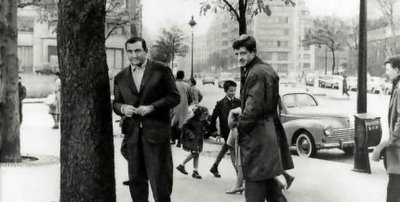 The only problem was that “Classe tous risques” didn’t fit into the Nouvelle Vague category, it seemed more a leftover from the 1950s. Or a breakthrough from the 1940s. It has been labeled so many things over the years, that we will attempt to get to the bottom of its success. But first you must understand that “Classe tous risques” was never officially released in this country. It played the second rate movie houses, never obtaining the luster and respect of “À bout de souffle” or “Tirez sur le pianiste” – two other 1960 French films that benefited greatly from their Vaguiste directors – Jean-Luc Godard and François Truffaut.
The only problem was that “Classe tous risques” didn’t fit into the Nouvelle Vague category, it seemed more a leftover from the 1950s. Or a breakthrough from the 1940s. It has been labeled so many things over the years, that we will attempt to get to the bottom of its success. But first you must understand that “Classe tous risques” was never officially released in this country. It played the second rate movie houses, never obtaining the luster and respect of “À bout de souffle” or “Tirez sur le pianiste” – two other 1960 French films that benefited greatly from their Vaguiste directors – Jean-Luc Godard and François Truffaut. Without that particular cinematic blessing bestowed upon it, it lingered in limbo – never really obtaining an audience stateside. In Europe it was a different case. Building a Class “A” reputation over the decades to become respected wildly by many filmmakers. Finally, it earned enough respect to be completely restored, dusted off, set up with new subtitles and officially released this year! It is a gem. The film discovery of the year. We left the theatre on a cloud and still cannot believe that for over four decades it had languished in the celluloid dustbin.
Without that particular cinematic blessing bestowed upon it, it lingered in limbo – never really obtaining an audience stateside. In Europe it was a different case. Building a Class “A” reputation over the decades to become respected wildly by many filmmakers. Finally, it earned enough respect to be completely restored, dusted off, set up with new subtitles and officially released this year! It is a gem. The film discovery of the year. We left the theatre on a cloud and still cannot believe that for over four decades it had languished in the celluloid dustbin.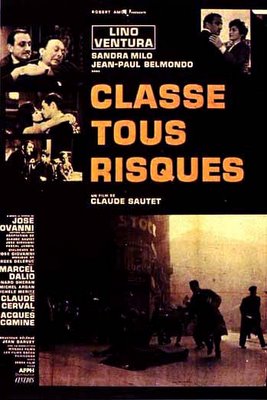
“Classe tous risques” is certainly in the tradition of such great French crime flicks as “Rififi” and “Bob le flambeur.” While we greatly admire those gems of the genre courtesy of Jules Dassin and Jean-Pierre Melville, we doff our hat at the sublime brilliance of director Claude Sautet. This is far more than a caper flick, or examination of the seedy underbelly of the French crime world. This film is so slick in its entertainment values, rich in its characterizations, and so wonderfully complete in its storytelling abilities that it leaves other crime noirs in the dust.
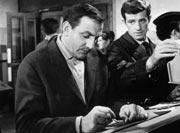 Telling the tale of petty thief Abel Davos and his return to Paris after a self imposed exiled abroad, Sautet paints a portrait of the anti-hero as thug, father, teacher and saint. Lino Ventura is absolutely riveting in the lead role of Abel Davos. Determined to return to the City of Lights despite the risk involved, he dares the unthinkable by dragging his wife and two young sons along for the ride. When his plans meet a less than desirable end, he finds himself a desperate fugitive holed up in a cold water flat – barely managing to keep one step ahead of the police.
Telling the tale of petty thief Abel Davos and his return to Paris after a self imposed exiled abroad, Sautet paints a portrait of the anti-hero as thug, father, teacher and saint. Lino Ventura is absolutely riveting in the lead role of Abel Davos. Determined to return to the City of Lights despite the risk involved, he dares the unthinkable by dragging his wife and two young sons along for the ride. When his plans meet a less than desirable end, he finds himself a desperate fugitive holed up in a cold water flat – barely managing to keep one step ahead of the police.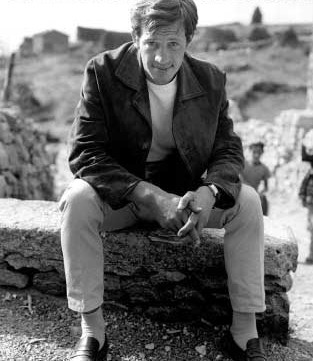 In his labyrinthine cat-and-mouse game with le flic, he is abetted by a young tough Eric Stark, played with a full out deadpan sexiness by the very definition of Gallic virility – Jean-Paul Belmondo. The eventual dénouement is not so very difficult to guess, but Good Lord the ride is pure cinematic joy! We have always believed that the plot to any great film is secondary to the visual storytelling capabilities of the director in charge, and this film is no exception. Claude Sautet starts the film on a wondrous note of mortal danger and expository slight of hand by depicting the day to day petty thievery of Abel and his current partner in crime. It is practically a silent half hour of pure cinema. The two thugs pull off a caper in bright daylight that not only exposes them to the Italian police, but perfectly encapsulates their small time crook lifestyle and the lengths they are willing to go to in order to score a heist.
In his labyrinthine cat-and-mouse game with le flic, he is abetted by a young tough Eric Stark, played with a full out deadpan sexiness by the very definition of Gallic virility – Jean-Paul Belmondo. The eventual dénouement is not so very difficult to guess, but Good Lord the ride is pure cinematic joy! We have always believed that the plot to any great film is secondary to the visual storytelling capabilities of the director in charge, and this film is no exception. Claude Sautet starts the film on a wondrous note of mortal danger and expository slight of hand by depicting the day to day petty thievery of Abel and his current partner in crime. It is practically a silent half hour of pure cinema. The two thugs pull off a caper in bright daylight that not only exposes them to the Italian police, but perfectly encapsulates their small time crook lifestyle and the lengths they are willing to go to in order to score a heist. By saddling Abel with a wife and two sons, the severity of the situation is highlighted and humanized. While we are familiar with the anti-hero glorification of thieves and murderers in cinema lore, from “Scarface” to “Bonnie and Clyde” – here we encounter a rarity. A family man whose only outlet is crime, and whose choices while dangerous are always made with his children front of mind. The beautifully modulated direction by Sautet and “in-the-know” screenplay by José Giovanni reflect the total human experience in risking your life daily by breaking the law. This is no “Shoot-em-in-da-head-and-ask-questions-later” type of crime flick.
By saddling Abel with a wife and two sons, the severity of the situation is highlighted and humanized. While we are familiar with the anti-hero glorification of thieves and murderers in cinema lore, from “Scarface” to “Bonnie and Clyde” – here we encounter a rarity. A family man whose only outlet is crime, and whose choices while dangerous are always made with his children front of mind. The beautifully modulated direction by Sautet and “in-the-know” screenplay by José Giovanni reflect the total human experience in risking your life daily by breaking the law. This is no “Shoot-em-in-da-head-and-ask-questions-later” type of crime flick.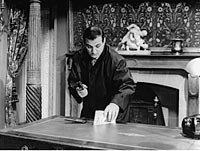 When we were absorbed watching this great film, we kept thinking to ourselves: “Selves, have we ever seen a crime neo-noir tell such a rich character study?” Not that we can recall. From the no-nonsense hardened career criminal that is Abel Davos to the young turk Eric Stark who aspires to help and continually risks his own life in the defense of his newfound pal, to the two young boys who play at the outskirts of the Asphalt Jungle – knowing full well that there time with their father may be limited. The seemingly casual scenes between Abel and a neighbor girl in his cold water hideaway play beautifully as a flirtation scene and pay off exquisitely when the slapdown comes and she subtly helps him pull off his escape.
When we were absorbed watching this great film, we kept thinking to ourselves: “Selves, have we ever seen a crime neo-noir tell such a rich character study?” Not that we can recall. From the no-nonsense hardened career criminal that is Abel Davos to the young turk Eric Stark who aspires to help and continually risks his own life in the defense of his newfound pal, to the two young boys who play at the outskirts of the Asphalt Jungle – knowing full well that there time with their father may be limited. The seemingly casual scenes between Abel and a neighbor girl in his cold water hideaway play beautifully as a flirtation scene and pay off exquisitely when the slapdown comes and she subtly helps him pull off his escape.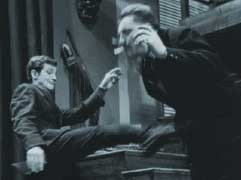 The fence, who has history with Abel and his crew is played in a marvelously brittle fashion by that old Continental character actor Marcel Dalio of “Casablanca” fame, with his shrewish daughter eavesdropping into the conversations and making the worst out of the situation.
The fence, who has history with Abel and his crew is played in a marvelously brittle fashion by that old Continental character actor Marcel Dalio of “Casablanca” fame, with his shrewish daughter eavesdropping into the conversations and making the worst out of the situation. Abel’s former friends and colleagues in crime slowly begin to distance themselves in order to protect their own dens of inequity. But at what price? It is left to the protégée Erik Stark to fill in the missing role of reluctant right hand man, especially as his attention has of late been drawn to their roadside saviour, Liliane, as played by a young Sandra Milo who barely guesses at their real story but is enamored enough by Eric’s manliness and seductive lips to give it a try. The enormous attributes and sensual charms of Sandra Milo would be put to fame enhancing effect with her later work on Fellini’s “8 ½” and “Juliet of the Spirits.”
Abel’s former friends and colleagues in crime slowly begin to distance themselves in order to protect their own dens of inequity. But at what price? It is left to the protégée Erik Stark to fill in the missing role of reluctant right hand man, especially as his attention has of late been drawn to their roadside saviour, Liliane, as played by a young Sandra Milo who barely guesses at their real story but is enamored enough by Eric’s manliness and seductive lips to give it a try. The enormous attributes and sensual charms of Sandra Milo would be put to fame enhancing effect with her later work on Fellini’s “8 ½” and “Juliet of the Spirits.” The manner in which Claude Sautet manages to bridge all the stories, tie them in thematically and use the various characters brilliantly for their own rewards is the very success of this film. Apparently it was a very slapdash, or shall we say difficult shoot. Even without knowing the backstory – we can’t help but feel that it contributes to the overall feel of dread and time and the police closing in on our anti-heros. When the end comes, it blindsides you with its emotional power.
The manner in which Claude Sautet manages to bridge all the stories, tie them in thematically and use the various characters brilliantly for their own rewards is the very success of this film. Apparently it was a very slapdash, or shall we say difficult shoot. Even without knowing the backstory – we can’t help but feel that it contributes to the overall feel of dread and time and the police closing in on our anti-heros. When the end comes, it blindsides you with its emotional power.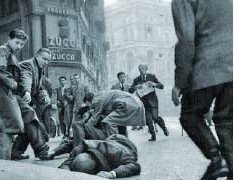 Which in many ways is all that you can ask for a film. One that draws you in from the very beginning, captures your heart and mind for a spell, and leaves you feeling weak from the totality of the experience. A great film. And a joy to have been brought back to us in such a classy restored edition. One for the ages. Bless you all!!
Which in many ways is all that you can ask for a film. One that draws you in from the very beginning, captures your heart and mind for a spell, and leaves you feeling weak from the totality of the experience. A great film. And a joy to have been brought back to us in such a classy restored edition. One for the ages. Bless you all!!Directed by Claude Sautet
Written by Claude Sautet, José Giovanni and Pascal Jardin
Based on the novel by José Giovanni
Starring
Lino Ventura as Abel Davos
Jean-Paul Belmondo as Eric Stark
Sandra Milo as Liliane
Marcel Dalio as Arthur Gibelin
Michel Ardan as Riton Vintran
Simone France as Therese Davos
Robert Desnoux as Pierrot
Thierry Lavoye as Daniel
Cinematography by Ghislain Cloquet
Film Editing by Albert Jurgenson
Original Music by Georges Delerue
Production Design by Rino Mondellini


<< Home